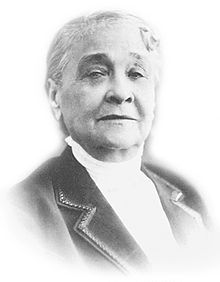Chiquinha Gonzaga
| Chiquinha Gonzaga | |
|---|---|

Chiquinha Gonzaga at age 78
|
|
| Native name | Francisca Edwiges Neves Gonzaga |
| Born |
October 17, 1847 Rio de Janeiro, Empire of Brazil |
| Died | February 28, 1935 (aged 87) |
| Nationality | Brazilian |
| Occupation | Composer, Pianist, Conductor |
| Notable work | Atraente, Ó Abre Alas, Forrobodó, Jurití |
| Style | Choro, Polka, Samba, Brazilian tango, Marcha, Valsa |
| Spouse(s) | Jacinto Ribeiro do Amaral |
| Parents |
|
Francisca Edwiges Neves Gonzaga, famously known as Chiquinha Gonzaga (Portuguese pronunciation: [ʃiˈkiɲɐ ɡõˈzaɡɐ]; October 17, 1847, Rio de Janeiro – February 28, 1935, Rio de Janeiro) was a Brazilian composer, pianist and the first woman conductor in Brazil.
Chiquinha Gonzaga was the first pianist of "choro" and author of the first carnival march, "Ó Abre Alas "(1899). Her plays and operettas, such as Forrobodó and Jurití, were a great success with the public because they used elements of Brazilian popular culture of the time.
In the Passeio Público of Rio de Janeiro, there is a herm in her honor by the sculptor Honorius Peçanha. In May 2012, it was enacted the law 12624 establishing the National Day of Brazilian Popular Music, celebrated on the day of her birthday.
Chiquinha Gonzaga was born in Rio de Janeiro, from a mulatto mother and a wealthy white father – after she was born her father became a marshal. Her godfather was Luís Alves de Lima e Silva, Duke of Caxias. For her mother, a mestizo and poor woman, the birth of Chiquinha was a very difficult, in part because of the risk that the father would not recognize the paternity of her daughter. Indeed, José Basileu, the military promising career, from a wealthy family, suffered from the pressure of his parents, who were against his marriage with Rosa. Despite these disagreements, he accepted the child as his daughter and married.
Like all girls of a military family in the 19th century, Chiquinha Gonzaga was very well educated. Her father, very strict with her education,prepared her for a successful future: a good marriage that would raise her to the category of "lady". She learned to read and write, do maths and primarily play the piano. Therefore, the music became her sole purpose in life. At age 11, she composed her first musical work.
...
Wikipedia
